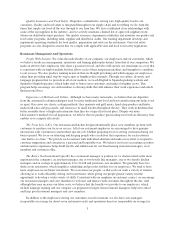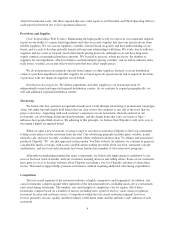Chipotle 2006 Annual Report Download - page 18
Download and view the complete annual report
Please find page 18 of the 2006 Chipotle annual report below. You can navigate through the pages in the report by either clicking on the pages listed below, or by using the keyword search tool below to find specific information within the annual report.could be compromised in the future, which could result in the misappropriation of customer information or the
disruption of our systems. Either of those consequences could have a material adverse effect on our reputation
and business or subject us to additional liabilities.
Failure to receive frequent deliveries of higher-quality food ingredients and other supplies could harm
our operations.
Our ability to maintain our menu depends in part on our ability to acquire ingredients that meet our
specifications from reliable suppliers. Shortages or interruptions in the supply of ingredients caused by
unanticipated demand, problems in production or distribution, food contamination, inclement weather or other
conditions could adversely affect the availability, quality and cost of our ingredients, which could harm our
operations. If any of our distributors or suppliers performs inadequately, or our distribution or supply
relationships are disrupted for any reason, our business, financial condition, results of operations or cash flows
could be adversely affected. We currently depend on multiple suppliers for our pork, chicken and beef supplies.
It could be more difficult to replace our pork suppliers if we were no longer able to rely on them due to the
unique nature of the products we receive from them. We do not have long-term contracts with any of our
suppliers. In addition, we have relied on the same distribution network as McDonald’s. We may have to seek new
suppliers and service providers with pricing or other terms less favorable than those we currently enjoy. If we
cannot replace or engage distributors or suppliers who meet our specifications in a short period of time, that
could increase our expenses and cause shortages of food and other items at our restaurants, which could cause a
restaurant to remove items from its menu. If that were to happen, affected restaurants could experience
significant reductions in sales during the shortage or thereafter, if our customers change their dining habits as a
result. Our focus on a limited menu would make the consequences of a shortage of a key ingredient more severe.
In addition, our approach to competing in the restaurant industry depends in large part on our continued
ability to adhere to the principle of “Food With Integrity.” We use a substantial amount of naturally raised and
sustainably grown ingredients, and try to make our food as fresh as we can, in light of pricing considerations. As
we increase our use of these ingredients, the ability of our suppliers to expand output or otherwise increase their
supplies to meet our needs may be constrained. Our inability to obtain a sufficient and consistent supply of these
ingredients on a cost-effective basis, or at all, could cause us difficulties in aligning our brand with the principle
of “Food With Integrity.” That could make us less popular among our customers and cause sales to decline.
Our business could be adversely affected by increased labor costs or difficulties in finding the right
employees for our restaurants.
Labor is a primary component of our operating costs, and we believe good managers and crew are a key part
of our success. We devote significant resources to recruiting and training our restaurant managers and crew.
Increased labor costs due to factors like competition, increased minimum wage requirements, employee benefits
and changes due to our new restaurant staffing structure would adversely impact our operating costs. Our success
also depends in part on the energy and skills of our employees and our ability to hire, motivate and keep qualified
employees, including especially restaurant managers and crew members. Our failure to find and keep enough
employees who are a good fit with our culture could delay planned restaurant openings, result in higher employee
turnover or require us to change our culture, any of which could have a material adverse effect on our business
and results of operations. Restaurant operators have traditionally experienced relatively high employee turnover
rates. Any increase in our turnover rates for managers or crew could be costly.
Governmental regulation may adversely affect our ability to open new restaurants or otherwise adversely
affect our existing and future operations and results.
We are subject to various federal, state and local regulations. Each of our restaurants is subject to state and
local licensing and regulation by health, alcoholic beverage, sanitation, food and workplace safety and other
agencies. We may experience material difficulties or failures in obtaining the necessary licenses or approvals for
12
























